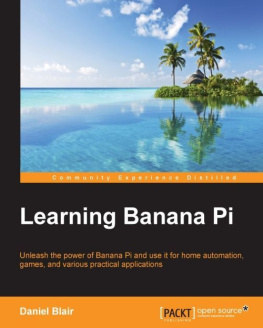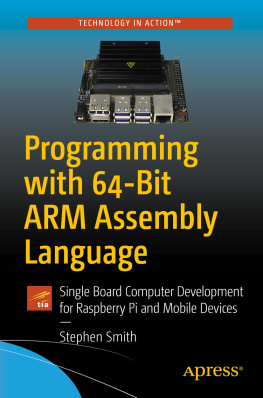Daniel Blair - Learning Banana Pi
Here you can read online Daniel Blair - Learning Banana Pi full text of the book (entire story) in english for free. Download pdf and epub, get meaning, cover and reviews about this ebook. year: 2015, publisher: Packt Publishing - ebooks Account, genre: Home and family. Description of the work, (preface) as well as reviews are available. Best literature library LitArk.com created for fans of good reading and offers a wide selection of genres:
Romance novel
Science fiction
Adventure
Detective
Science
History
Home and family
Prose
Art
Politics
Computer
Non-fiction
Religion
Business
Children
Humor
Choose a favorite category and find really read worthwhile books. Enjoy immersion in the world of imagination, feel the emotions of the characters or learn something new for yourself, make an fascinating discovery.
- Book:Learning Banana Pi
- Author:
- Publisher:Packt Publishing - ebooks Account
- Genre:
- Year:2015
- Rating:3 / 5
- Favourites:Add to favourites
- Your mark:
Learning Banana Pi: summary, description and annotation
We offer to read an annotation, description, summary or preface (depends on what the author of the book "Learning Banana Pi" wrote himself). If you haven't found the necessary information about the book — write in the comments, we will try to find it.
Unleash the power of Banana Pi and use it for home automation, games, and various practical applications
About This Book- Using Banana Pi, learn how to install and build basic projects from start to end
- Learn all the fundamentals and uses of Banana Pi to build projects in a short amount of time
- A step-by-step practical guide that teaches you how to get up and start running with Banana Pi to start working on your own projects
This book is for anyone who wants to explore Banana Pi and get started building projects on their own using it. No prior experience of working with single board computers is required.
What You Will Learn- Get started with single-board computing by diving deep into the operating system and hardware of Banana Pi
- Interact with the GPIO pins from scripts and code to start programming on the board
- Connect hardware components to the GPIO pins and control them directly from Banana Pi
- Connect Banana Pi devices with your home network to download packages from the Internet
- Link your Banana Pi remotely with other computers via SSH to run as a headless device
- Work with the onboard IR receiver of Banana Pi as well as connect external sensors and interact with them through their code
- Build an Internet radio powered by Banana Pi to stream podcasts and music
- Build and run a home server using Banana Pi to sync files, calendars, and contacts
Banana Pi is a small but powerful ARM board that can run on multiple operating systems. Banana Pi has been adopted by tech-savvy enthusiasts and hobbyists to develop their projects.
This book will take you from opening your Banana Pis box for the first time all the way to working with hardware and code. We will explore the different configuration options and operating system choices. Youll proceed to working with Banana Pi hooked up to a breadboard and connecting hardware components such as LEDs and motors to the board. Further, youll build an Internet radio working with an LCD display, interacting with user input, and streaming audio over the Internet. This book also acquaints you with another really popular use of Banana Pi, home servers. Finally, youll realize the power of the robust hardware of Banana Pi by playing games on Android and Linux.
By the end of this book, you should be familiar with the basics of development using Banana Pi, from installation to building basic projects.
Daniel Blair: author's other books
Who wrote Learning Banana Pi? Find out the surname, the name of the author of the book and a list of all author's works by series.








